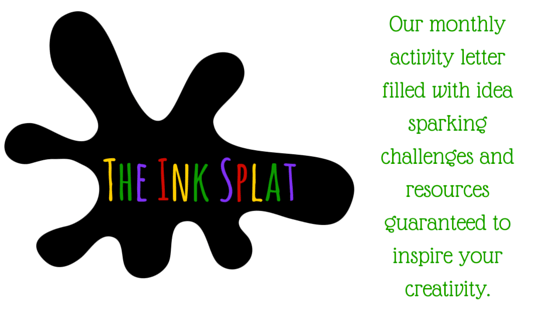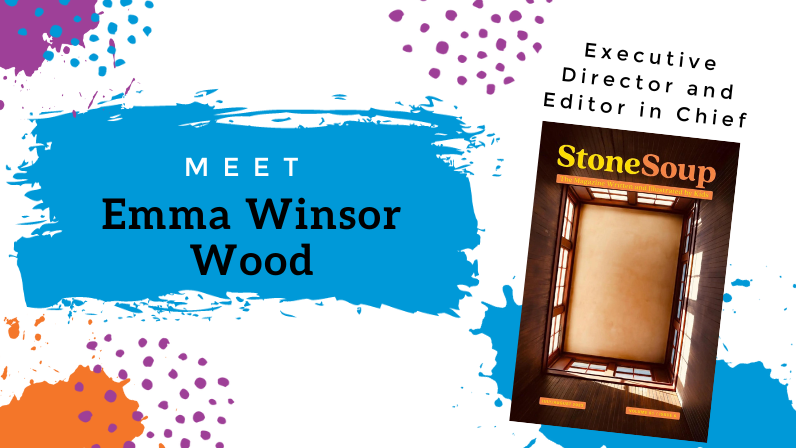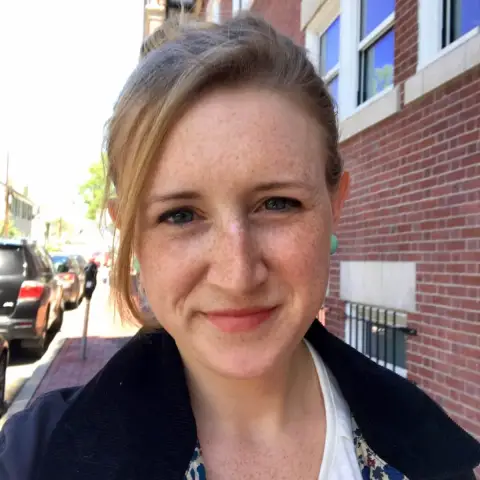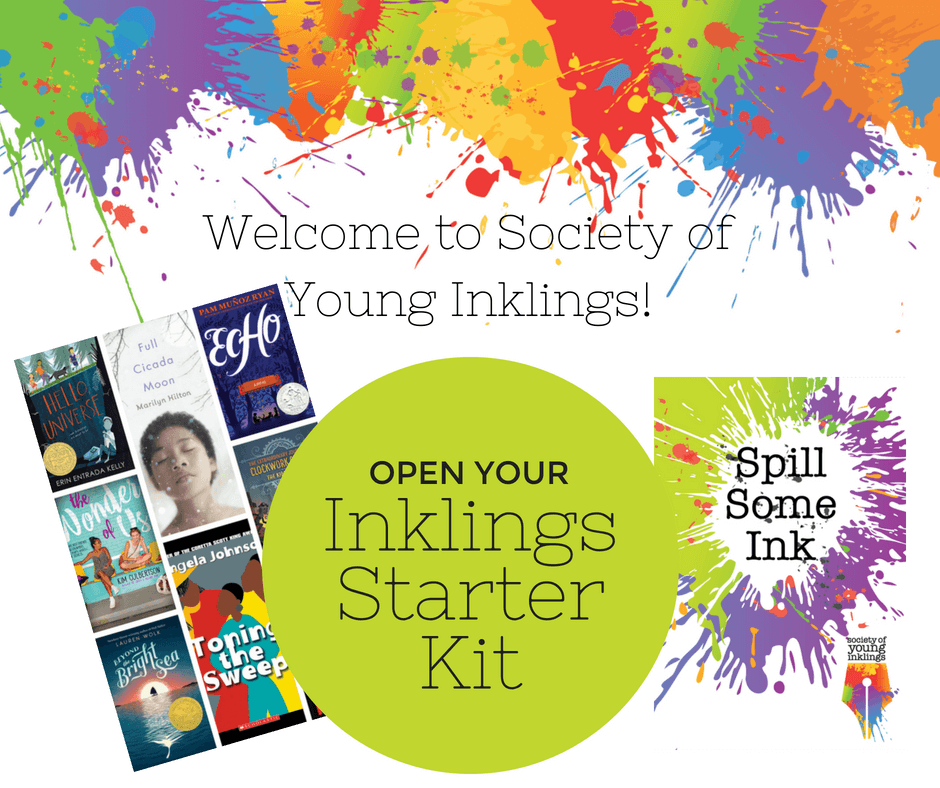Our August Ink Splat Author Interview features Emma Winsor Wood. Emma is a writer, poet, and the Executive Director and former Editor-in-Chief for Stone Soup, a literary magazine that features writing from young writers. This was a special edition of our Author Interview Series as it was, in part, a celebration of Stone Soup’s 50th Anniversary!
We discussed Emma’s role as an editor and what it was like to manage a literary magazine. She spoke about supporting the wonderful and unique ideas of young writers.
To learn more, visit www.stonesoup.com or Emma’s personal site, emmawinsorwood.com

Writing Challenge
“Three Genre Challenge”
Read outside of your comfort zone and it will add so many new dimensions to your writing.
Choose three different genres of your choice: one must be a genre that you really love, the second must be one that you have read before and have some familiarity with, and the last must be a genre that you have barely (or never) read before. For example, you might choose fantasy, historical fiction, and mystery.
When you’ve chosen your three genres, choose/create a main character and sketch out three different synopses (or entire stories, if you wish). Each synopsis should be about the character in a story in a different genre style. Before you write, first consider what kinds of details would be essential to include for each type.
For instance, if you chose a character by the name of Desmond Blackstone, how could you write about this character in a story based on fantasy? How about a story about Desmond that incorporates a different historical context (where it could have happened, but didn’t)? Or what about fitting our protagonist into a story in the style of a nail-biting mystery?
Your mission is to write three synopses that would convince the reader that your character comes from stories in three different writing genres.
Best of luck and don’t forget to be open to new and different genres. Your writing craft will only be better for it!

As an editor, you make grand decisions on behalf of the writer’s future readers. When you’re in that role of the decision maker, is it more of a choice about curating how the pieces go together, or if it’s more of a quality of writing choice, or if it’s a blend of those two?
I don’t read for a specific issue when I’m reading submissions. I read and think, and make an independent decision of which issue they will go in. I would say it’s completely based on the body of the submission. Often in the back of my mind, I’ll have a sense that we’ve just accepted a story like this, or we’ve published a lot of stories like this, which might make the bar a little bit higher for that type of story or that topic. For instance, we do get a lot of fantasy dystopian stories. It’s just a very popular form of writing. Everyone loves to read them and so I think for those stories, I might have a higher bar. If the topic of a story or poem surprises me, then it might have to surprise me less on the language level. So, all these things are kind of working together. It’s not just the language, it’s not just the topic, it’s not just the pacing or the plot, it’s kind of how all these things are working together.
Stone Soup publishes pieces by children. I’m curious if you have thoughts about what is special about publishing work by young people. Have you noticed any unique qualities that youth writers bring with their voices in particular?
Yes, definitely. I hadn’t had much experience reading children’s writing when I first started at Stone Soup, and it has been really amazing to have the opportunity to do so. Children, especially in the Stone Soup age range… there’s something magic about that age. I think it’s because there isn’t this hang-up with convention or appropriateness with language, so many times, youth writers are writing without barriers. They’re not so tied up with conventions of normal speech or literature, these things that as you age become really ingrained to a point where it can actually be difficult to think of a new way to describe something, like the sun or the sky. These things have been described so many times, and you have all these different words and set phrases rattling around in your head… and kids for the most part are free from that. That freedom is part of what makes writing by young authors so special.
Youth writers are also generally more playful, and they’re not afraid to just have fun and they don’t worry so much about embarrassing themselves. I’m so drawn into the writing and I’m always surprised. I love those surprising moments where I feel, “Oh, wow, only a kid could have written it that way.” I do think there’s just this freshness and originality and experimental playfulness that I see in the writing. It’s just so exciting to me and I’ve learned a lot from our youth writers.

A special thank you to Emma Winsor Wood for sharing with us!
Emma joined Stone Soup as Editor in 2017. As a writer, she has experienced firsthand the power of publication to validate, motivate, and inspire, and she is grateful for the opportunity to validate, motivate, and inspire young people via Stone Soup.
Emma is a poet, essayist, and translator. She holds a BA from Harvard in Russian History & Literature, an MFA in poetry from the Iowa Writers’ Workshop, and a Ph.D. in literature from UC Santa Cruz. Her books include The Real World (BlazeVOX, 2022) and A Failed Performance (Plays Inverse, 2018). Her poetry has received fellowships from the Iowa Writers’ Workshop, the Napa Valley Writers’ Conference, and the Community of Writers at Squaw Valley, in addition to appearing in a number of literary journals.
She currently lives with her husband—writer, professor, and Stone Soup teacher Conner Bassett—their two young children, and two aging dogs in Connecticut. You can read more about her on her personal website.

INKLINGS CELEBRATE
Join us for Summer Camp!
We’re inviting passionate young writers to join us on Zoom for writerly summer camp experiences. Each camp will include skill-building activities, time for drafting, and collaboration with peers.
Upcoming at Inklings
MAY
- Register for Inklings summer programs like 1-on-1 Mentorship, Young Author's Studio Summer Camps, and Inklings Membership
- Details coming soon for our Student Showcase events
JUNE
- 6/10-13: World Creation 101 and I Am the Story Summer Camps
- 6/17-20: Playwriting and Design a Novel Summer Camps
- 6/24-27: Reality Hunger and Literature in Miniature Summer Camps
JULY
- 7/8-11: Intro to Fiction Summer Camp
- 7/22-25: Intro to Poetry and Make Your Scenes Sparkle Summer Camps
AUGUST
- 8/5-9: Filmmaking as Dialogue and Editing and Revising Fiction Summer Camps
SPARK YOUR CREATIVITY!


